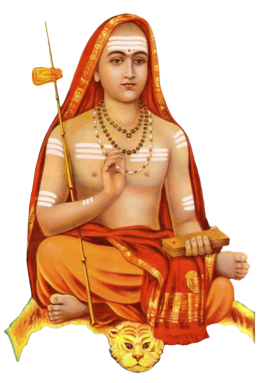मुखं विद्यते कल्पनाहीनमेकम् ।
तथा धी वियोगे निराभासको यः
स नित्योपलब्धिस्वरूपोऽहमात्मा ॥ ४॥
mukhaṃ vidyate kalpanāhīnamekam .
tathā dhī viyoge nirābhāsako yaḥ
sa nityopalabdhisvarūpo’hamātmā .. 4..
English Translation and Notes based on the Bhashya of Sri Sankara
Translated by S. N. Sastri
The Jiva is the reflection of Brahman-Atman (Self) in the mind. Just as the reflection of a face in a mirror is not real and has no existence apart from the face itself, the Jiva has no reality apart from Brahman whose reflection the Jiva is. But because of ignorance of his real nature, namely that he is in reality none other than Brahman, the Jiva identifies himself with the body-mind complex. It is this identification which is the cause of all suffering. When, as a result of the realisation of his real nature as Brahman, the identification with the body-mind complex comes to an end, all sufferings cease. This realisation of one’s real nature and the cessation of identification with the body-mind complex is what is spoken of as ‘the mind ceasing to exist’.The cessation of the mind thus means only the loss of the mind in its present form with its accumulated Vasanas or impressions left by past actions and thoughts, which are the cause of likes and dislikes and all their disastrous consequences. When these Vasanas are eliminated, the mind becomes pure and makes the Jiva capable of realizing his real nature. He then dissociates himself completely from the body and the mind and is no more affected by what happens to them. This is the state of Jivanmukti or liberation even while living.
Some (such as the Charvakas and Buddhists) consider the mind itself to be the Self or Atma. This view is refuted in the next verse.
Hastamalakiyam – Verse 4 – Hastamalaka-4-yathā darpaṇābhāva – In Sanskrit with English Transliteration, Translation, Meaning and Bhashya – Commentary by Sankaracharya – Hastamalakiyam-4

